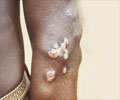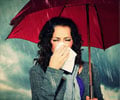Gram-negative bacteria are emerging a major threat to US hospitals. They could result in as heavy a toll as the dreaded MRSA.
Gram-negative bacteria are emerging a major threat to US hospitals. They could result in as heavy a toll as the dreaded MRSA. The bugs are especially hard to fight because they are wrapped in a double membrane and harbor enzymes that chew up many antibiotics.
Drug-resistant strains of Acinetobacter baumannii, Pseudomonas aeruginosa, Klebsiella pneumoniae and Escherichia coli, are the bacteria identified as a growing danger. Health authorities are gearing up for the fight.The bugs are considered as dangerous as MRSA, but some antibiotics can still treat it, and more are in development, experts say.
But the drugs once used to treat gram-negative bacteria are becoming ineffective, and finding effective new ones is difficult.
"We're literally running out of drugs to treat gram-negatives," said Dr. Brad Spellberg, an infectious disease specialist at Harbor-UCLA Medical Center. "And there is nothing in the pipeline right now."
Exact numbers are hard to come by, because infections by these three bacteria are not reportable by law. But using 2002 data voluntarily reported to the Centers for Disease Control and Prevention from about 300 large, mostly urban hospitals, the Infectious Diseases Society of America identified about 104,000 gram-negative infections that were resistant to at least some antibiotics, roughly the same as the 102,000 MRSA infections found that year.
A class of broad-spectrum antibiotics known as carbapenems have been the drug of last resort for gram-negative bugs.
Advertisement
As the drugs fail, doctors find themselves as a last resort turning to older, more toxic ones such as colistin, largely abandoned because of the severe side effects: kidney damage and deafness. At one East Coast hospital, the number of orders doctors made for colistin went from one in 2001 to 68 in 2007, Boucher said.
For the most part, gram-negative bacteria are hospital scourges -- harmless to healthy people but ready to infect already-damaged tissue. The bacteria steal into the body via ventilator tubes, catheters, open wounds and burns, causing pneumonia, urinary tract infections, and bone, joint and bloodstream infections.
Pseudomonas is widely found in soil and water, and rarely causes problems except in hospitals.
Klebsiella causes a sudden, severe pneumonia, mostly in people already suffering from ailments such as diabetes or chronic lung disease. Its telltale sign is a blood-tinged sputum dubbed "currant jelly." It can also cause urinary tract and abdominal infections.
Acinetobacter generally causes wound and bloodstream infections. It has become notorious among veterans of the wars in Iraq and Afghanistan. They are believed to have contracted it in field hospitals and carried it to veterans hospitals in the U.S.
The first U.S. outbreak of Klebsiella resistant to all known antibiotics occurred at a Brooklyn hospital in 2000. The so-called pan-resistant strain has since been found along the Eastern Seaboard and throughout the Midwest.
A December report of Israeli hospitals found mortality rates from pan-resistant Klebsiella to be 44%.
Doctors have no doubt that pan-resistant Klebsiella will show up in California and other states. California hospitals are already encountering strains that, although not resistant to all known antibiotics, are resistant to many. Harbor-UCLA had two cases of highly-drug-resistant Klebsiella last year, Spellberg said.
Similarly resistant strains of Pseudomonas and Acinetobacter also are on the rise, as are resistant strains of Escherichia coli, another gram-negative bacterium.
These four microbes are among the six leading causes of infections in hospitals, nursing homes and other healthcare settings, the Infectious Diseases Society of America reported.
The bacteria have remained largely off the public's radar, Boucher said, because they affect mostly the elderly or ill. But they do not always limit themselves that way. Drug-resistant Pseudomonas was behind the widely publicized Jan. 24 death of Brazilian beauty queen Mariana Bridi, 20, of sepsis -- a bloodstream infection.
The health department in Espirito Santo, Brazil, said what began as a urinary tract infection spread rapidly.
Bridi died after doctors had tried to contain the rampaging infection by amputating her feet and hands and removing her kidneys, reports Mary Engel for Los Angeles Times.
Source-Medindia
GPL/L













